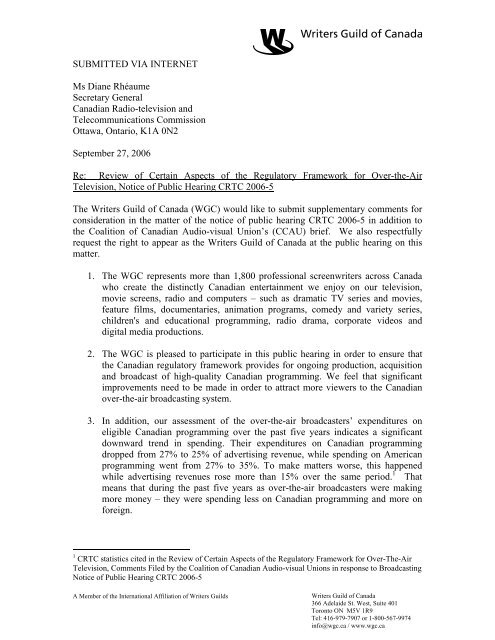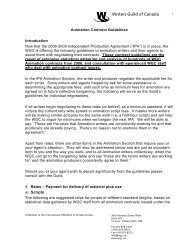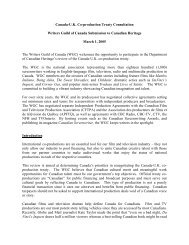VIA FAX AND EMAIL - Writers Guild of Canada
VIA FAX AND EMAIL - Writers Guild of Canada
VIA FAX AND EMAIL - Writers Guild of Canada
You also want an ePaper? Increase the reach of your titles
YUMPU automatically turns print PDFs into web optimized ePapers that Google loves.
SUBMITTED <strong>VIA</strong> INTERNET<br />
Ms Diane Rhéaume<br />
Secretary General<br />
Canadian Radio-television and<br />
Telecommunications Commission<br />
Ottawa, Ontario, K1A 0N2<br />
September 27, 2006<br />
Re: Review <strong>of</strong> Certain Aspects <strong>of</strong> the Regulatory Framework for Over-the-Air<br />
Television, Notice <strong>of</strong> Public Hearing CRTC 2006-5<br />
The <strong>Writers</strong> <strong>Guild</strong> <strong>of</strong> <strong>Canada</strong> (WGC) would like to submit supplementary comments for<br />
consideration in the matter <strong>of</strong> the notice <strong>of</strong> public hearing CRTC 2006-5 in addition to<br />
the Coalition <strong>of</strong> Canadian Audio-visual Union’s (CCAU) brief. We also respectfully<br />
request the right to appear as the <strong>Writers</strong> <strong>Guild</strong> <strong>of</strong> <strong>Canada</strong> at the public hearing on this<br />
matter.<br />
1. The WGC represents more than 1,800 pr<strong>of</strong>essional screenwriters across <strong>Canada</strong><br />
who create the distinctly Canadian entertainment we enjoy on our television,<br />
movie screens, radio and computers – such as dramatic TV series and movies,<br />
feature films, documentaries, animation programs, comedy and variety series,<br />
children's and educational programming, radio drama, corporate videos and<br />
digital media productions.<br />
2. The WGC is pleased to participate in this public hearing in order to ensure that<br />
the Canadian regulatory framework provides for ongoing production, acquisition<br />
and broadcast <strong>of</strong> high-quality Canadian programming. We feel that significant<br />
improvements need to be made in order to attract more viewers to the Canadian<br />
over-the-air broadcasting system.<br />
3. In addition, our assessment <strong>of</strong> the over-the-air broadcasters’ expenditures on<br />
eligible Canadian programming over the past five years indicates a significant<br />
downward trend in spending. Their expenditures on Canadian programming<br />
dropped from 27% to 25% <strong>of</strong> advertising revenue, while spending on American<br />
programming went from 27% to 35%. To make matters worse, this happened<br />
while advertising revenues rose more than 15% over the same period. 1 That<br />
means that during the past five years as over-the-air broadcasters were making<br />
more money – they were spending less on Canadian programming and more on<br />
foreign.<br />
1 CRTC statistics cited in the Review <strong>of</strong> Certain Aspects <strong>of</strong> the Regulatory Framework for Over-The-Air<br />
Television, Comments Filed by the Coalition <strong>of</strong> Canadian Audio-visual Unions in response to Broadcasting<br />
Notice <strong>of</strong> Public Hearing CRTC 2006-5<br />
A Member <strong>of</strong> the International Affiliation <strong>of</strong> <strong>Writers</strong> <strong>Guild</strong>s<br />
<strong>Writers</strong> <strong>Guild</strong> <strong>of</strong> <strong>Canada</strong><br />
366 Adelaide St. West, Suite 401<br />
Toronto ON M5V 1R9<br />
Tel: 416-979-7907 or 1-800-567-9974<br />
info@wgc.ca / www.wgc.ca
WGC Supplementary Comments to CCAU CRTC 2006-5 Submission page 2 <strong>of</strong> 4<br />
4. This reduction in Canadian television programming comes at a time when we<br />
need to communicate with our fellow citizens more than ever. As the most<br />
accessible and affordable means <strong>of</strong> communication, over-the-air television gives<br />
us the ability to identify with other Canadians. Whether you are new to this<br />
country, or your family has lived here for generations – television shows us what<br />
it means to be Canadian by reflecting our history, values and sense <strong>of</strong> humour.<br />
5. Although technology is <strong>of</strong>fering new ways <strong>of</strong> entertaining and informing<br />
Canadians, over-the-air broadcasting remains the foundation for communicating<br />
ideas in our country. Traditional forms <strong>of</strong> programming – such as one-hour<br />
television dramas – are enhanced by new digital forms <strong>of</strong> production and<br />
distribution, including webisodes and mobisodes, which provide complementary<br />
content. Since digital programs are delivered on a one-to-one basis, they will<br />
never replace the one-to-many experience delivered by broadcast television. We<br />
know this because overall per capita viewing numbers have increased from 23.7<br />
hours per week in 2001-02 to 25.1 hours per week in 2004-05. 2<br />
6. The reality is, Canadians are looking for high-quality programs – drama in<br />
particular. And what we don’t produce here, Canadians will look for elsewhere.<br />
In 1999 the over-the-air television policy was revised to allow for reality-based<br />
programs. While these programs remain popular, the audience demand for good<br />
drama has been consistent. Audience ratings demonstrate that a show like CTV’s<br />
Corner Gas is very popular with Canadians and can pull in more than a million<br />
viewers. 3 Unfortunately, there are not many examples <strong>of</strong> high-quality programs<br />
being produced to meet Canadian demand. Corner Gas is a success because all<br />
the stars were aligned – the showrunner and the rest <strong>of</strong> the screenwriters were<br />
experienced pr<strong>of</strong>essionals; it had sufficient development time; the production<br />
budget was adequate; the performers were experienced and recognizable<br />
Canadian stars; the show was cleverly promoted; and it was scheduled during<br />
prime-time. This shows it takes a serious commitment to produce high-quality<br />
programs, including script development expenditures, production funding,<br />
promotion <strong>of</strong> our on-air talent, and scheduling and promotion <strong>of</strong> the show.<br />
Unfortunately not enough is being done right now.<br />
7. The Canadian industry is primarily a television industry. In 2004/05, the total<br />
volume <strong>of</strong> Canadian television production was $1,685 billion ($1.1 <strong>of</strong> that was<br />
English-language production) compared to a total volume <strong>of</strong> feature film<br />
production <strong>of</strong> $253 million ($174 million <strong>of</strong> English-language production) 4 .<br />
Combined, the television and feature film production industry employs over<br />
119,500 Canadians in full-time jobs. 5<br />
2 CRTC Broadcasting Policy Monitoring Report, 2006<br />
3 From www.cornergas.com - Monday, September 18, 2006 – The first episode <strong>of</strong> Corner Gas season 4<br />
played to an audience <strong>of</strong> 1.3 million viewers.<br />
4 Pr<strong>of</strong>ile 2006: An Economic Report on the Canadian Film and Television Industry, p. 37<br />
5 Ibid. p. 13
WGC Supplementary Comments to CCAU CRTC 2006-5 Submission page 3 <strong>of</strong> 4<br />
8. Television is very much the screenwriter’s domain. The show’s bible and scripts<br />
are the centre <strong>of</strong> all activity for the other pr<strong>of</strong>essionals involved in the television<br />
show, such as the producers, directors, performers, editors, and technicians. In<br />
fact, the head screenwriter – called the showrunner – is the key creative position<br />
on a television series. Showrunners are involved in decisions concerning every<br />
aspect <strong>of</strong> development and production – from hiring the directors and performers<br />
and approving locations, costumes and set decoration, to ensuring the show comes<br />
in on budget and on time. In the U.S. showrunners are household names – J.J.<br />
Abrams – Alias and Lost; Aaron Sorkin – West Wing and Studio 60; David Chase<br />
– The Sopranos; John Wells – E.R.. Ours are not as familiar but we too have<br />
showrunners like Chris Haddock – Da Vinci’s Inquest and Intelligence; Brent<br />
Butt and Mark Farrell – Corner Gas; and Susin Nielsen – Robson Arms and Alice,<br />
I Think.<br />
9. High-quality productions also require experience and a broad talent base. We<br />
need to put more money into script and concept development, so screenwriters<br />
can write a range <strong>of</strong> scripts and then test those scripts to see which appeal to<br />
audiences. This is standard practice in Hollywood, where, as a rule <strong>of</strong> thumb,<br />
about 10 scripts are developed for each show that is produced. 6 In <strong>Canada</strong> there<br />
are usually only four scripts produced for every one show. We also need to invest<br />
more money at the front end <strong>of</strong> development: if a script needs another draft then<br />
there has to be money available or, if a script is not working, we need the ability<br />
to “burn” that script and start all over again. And once a series is greenlit for<br />
production, the story department should be fully staffed and working on the<br />
scripts as soon as possible. All <strong>of</strong> this requires money – and more money than we<br />
are currently investing. That’s why we have made a recommendation in our<br />
CCAU submission that private conventional TV broadcasters spend 7% <strong>of</strong> their<br />
gross ad revenue on Canadian drama, and that a reasonable proportion <strong>of</strong> their<br />
Canadian drama budget be allocated to script and concept development.<br />
10. Although money is the major factor in creating high-quality Canadian drama,<br />
there are other factors at play here. We need more original programming, not less.<br />
Repeats drive audiences away from Canadian drama. A quick look at the<br />
broadcast schedule <strong>of</strong> the conventional broadcasters shows television programs<br />
like Blue Murder, which originally aired from 2001 to 2004, is still on Global<br />
TV’s prime time schedule. 7 Global is also running repeats <strong>of</strong> the very low budget<br />
serial Train 48 in order to meet its Canadian content requirements. This is a<br />
particular affront given that these shows were supposed to be daily serialized<br />
stories about current events. There is nothing current about airing a show that<br />
was produced three years ago.<br />
6 Cited in the Review <strong>of</strong> Certain Aspects <strong>of</strong> the Regulatory Framework for Over-The-Air Television,<br />
Comments Filed by the Coalition <strong>of</strong> Canadian Audio-visual Unions in response to Broadcasting Notice <strong>of</strong><br />
Public Hearing CRTC 2006-5, page 9<br />
7 WGC research. Blue Murder is aired Saturday nights at 9 p.m. on Global.
WGC Supplementary Comments to CCAU CRTC 2006-5 Submission page 4 <strong>of</strong> 4<br />
11. New shows also need to be regularly scheduled during prime time in order to<br />
retain an audience. For example, CTV decided to order its own teenage version <strong>of</strong><br />
The O.C. called Whistler. It then aired the show during the summer months when<br />
very few Canadians are watching television, let alone a show about frolicking in<br />
the snow at Whistler. It was then bumped around several times in the schedule<br />
with the final two episodes airing on a Friday night in August. Another example<br />
at CTV is Instant Star, where seven <strong>of</strong> 13 episodes were run at 8:30 p.m. on<br />
Tuesdays before being bumped for Canadian Idol 8 on August 29, 2006. As <strong>of</strong> the<br />
date <strong>of</strong> this submission, Instant Star has not continued to air on CTV.<br />
12. We <strong>of</strong>ten look to the number <strong>of</strong> high-quality dramas coming out <strong>of</strong> the United<br />
States and wonder why we can’t do the same. We have to remember we are on a<br />
totally different playing field. The United States has a population <strong>of</strong> almost 300<br />
million people. We have an English-language population <strong>of</strong> only 18 million, and<br />
our television market is split into two languages, French and English. We cannot<br />
compete on the same terms as the Americans. That is why we need the CRTC to<br />
regulate the broadcast industry to ensure we can produce high-quality television<br />
and tell stories that reflect our values, history and humour. We shouldn’t be<br />
forced to accept a foreign culture as our own.<br />
13. The WGC thanks the CRTC for this opportunity to provide our comments in<br />
respect to the improvements that need to be made to the Canadian regulatory<br />
framework in order to provide for the ongoing production, acquisition and<br />
broadcast <strong>of</strong> high-quality Canadian programming, and would be pleased to reply<br />
to any further questions.<br />
Sincerely,<br />
Maureen Parker<br />
Executive Director<br />
<strong>Writers</strong> <strong>Guild</strong> <strong>of</strong> <strong>Canada</strong><br />
8 WGC research.
















